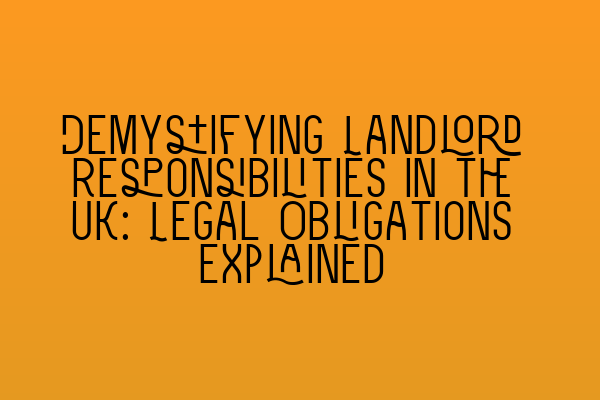Demystifying Landlord Responsibilities in the UK: Legal Obligations Explained
As a landlord in the UK, it is crucial to have a clear understanding of your legal responsibilities. Failing to comply with these obligations can lead to serious consequences, including legal disputes, financial penalties, and damage to your reputation. In this blog post, we will demystify the landlord responsibilities in the UK and provide a comprehensive explanation of the legal obligations you need to fulfill.
1. Property Maintenance and Repairs
One of the primary responsibilities of a landlord is to ensure that the rental property is maintained in a safe and habitable condition. This includes repairing structural issues, fixing faulty appliances, and addressing any health and safety concerns. Regular inspections should be conducted to identify and address maintenance issues promptly.
2. Gas and Electrical Safety
Landlords are legally required to ensure the safety of gas and electrical installations in their rental properties. Gas appliances must be inspected annually by a Gas Safe registered engineer, and a Gas Safety Certificate should be provided to tenants before they move in. Similarly, the electrical installations and appliances should be tested regularly by a qualified electrician to ensure compliance with the Electrical Safety Standards in the Private Rented Sector (England) Regulations 2020.
3. Energy Performance
Landlords are obligated to provide an Energy Performance Certificate (EPC) to tenants, which rates the property’s energy efficiency. The EPC helps tenants understand the energy costs associated with the rental property and provides recommendations for improving efficiency. Landlords must ensure that the property meets the minimum energy efficiency standards as outlined in the Energy Efficiency (Private Rented Property) (England and Wales) Regulations 2015.
4. Fire Safety
Fire safety is of utmost importance in rental properties. Landlords must ensure that the property has adequate fire precautions in place, including smoke detectors and carbon monoxide alarms. Furniture and furnishings provided by the landlord should meet the fire resistance requirements outlined in the Furniture and Furnishings (Fire) (Safety) Regulations 1988.
5. Tenancy Deposit Protection
When a tenant pays a deposit, it must be safeguarded through a government-approved tenancy deposit protection scheme. Landlords are required to provide tenants with details of the scheme within 30 days of receiving the deposit. At the end of the tenancy, the deposit must be returned promptly, minus any deductions for unpaid rent or damages, in adherence to the scheme rules.
6. Right to Rent Checks
Landlords have a legal duty to conduct immigration right to rent checks on potential tenants. This involves verifying the immigration status of all adults who will be living in the rental property as their main residence. A failure to perform the necessary checks can result in severe penalties. It is always advisable to seek legal advice or consult the Home Office’s guidance for detailed information on conducting right to rent checks.
7. Repairs and Maintenance of Common Areas
If you are a landlord of a property within a block or complex with shared common areas, you may have additional responsibilities for their maintenance and repairs. This is especially true if you are a leaseholder or a member of a residents’ management company. It is essential to review the terms of your lease and understand your obligations regarding the common areas.
8. Compliance with Local Authority Regulations
Landlords must comply with any additional regulations or requirements imposed by the local authority, such as licensing schemes or selective licensing. These regulations vary depending on the area and can include obligations related to property standards, tenant management, and landlord accreditation.
It is crucial for landlords to stay updated with the latest changes in legislation and regulations to ensure full compliance with their obligations. Seeking professional legal advice is always recommended, especially if you are unfamiliar with certain aspects of landlord responsibilities.
For comprehensive guidance on the legal framework surrounding landlord responsibilities in the UK, including insights on property law and land law, consider reading our related articles:
1. 44. Essential SQE Textbooks: Building a Solid Foundation for Exam Prep
2. 43. Unraveling the SQE Stages: A Roadmap to Success
3. 41. Test Centers for SQE: Convenient Locations for the Exam
4. 39. Skills Assessed in SQE: Understanding the Exam Content
5. 40. Interviewing in SQE: Mastering the Assessment Process
Remember, being a responsible landlord not only ensures compliance with the law but also fosters positive tenant relationships and protects your investment in the long run.
